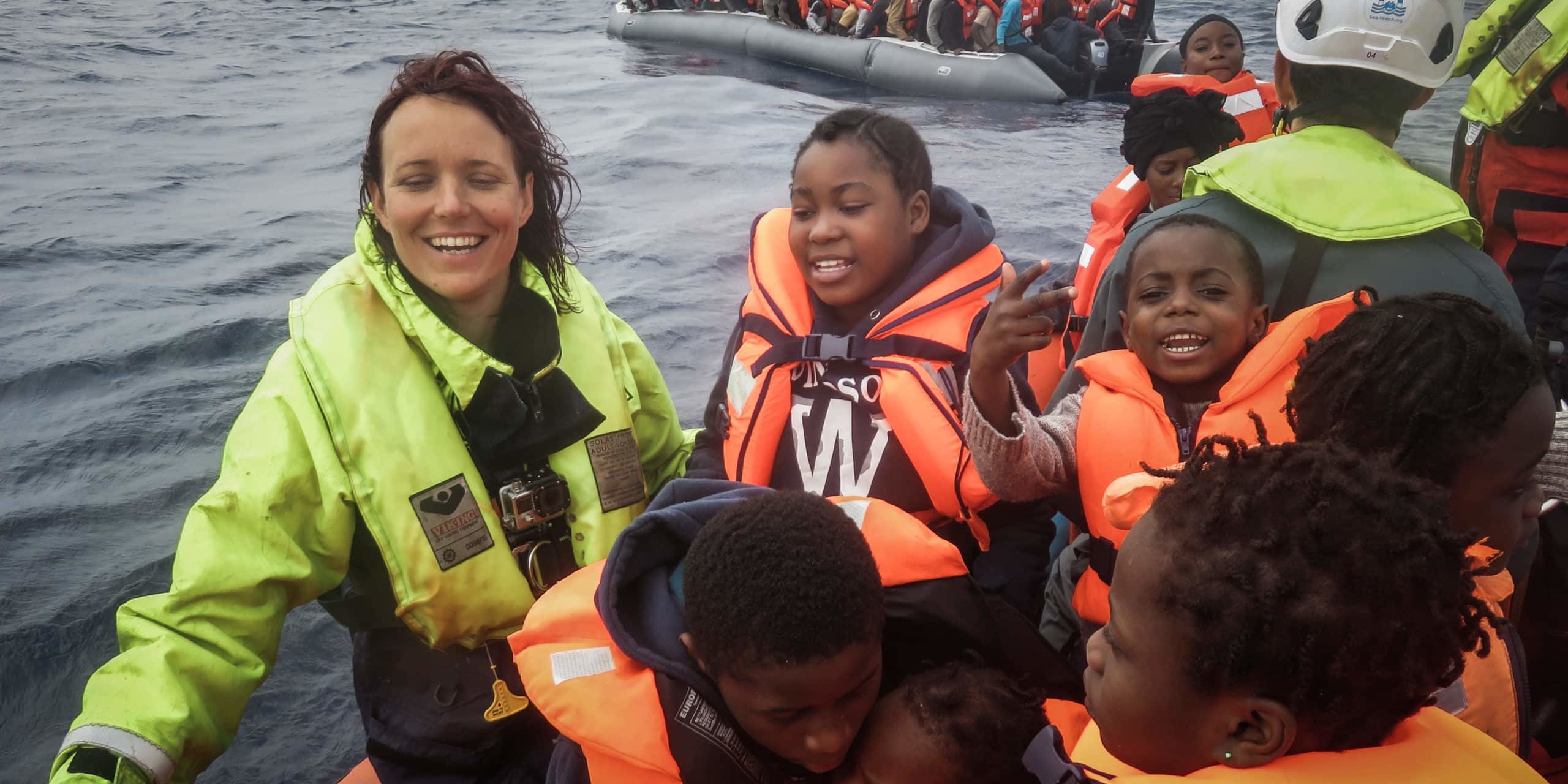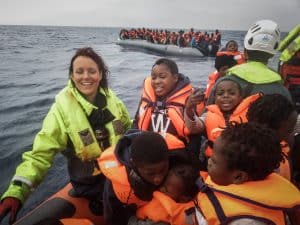In recent days and weeks, events came thick and fast on Europe’s deadliest sea border in terms of civil rescue at sea, and a number of landmark decisions are imminent. For this reason we make a summary of recent developments in the Mediterranean.
The most important developments:
Sea-Watch saves more than 300 people, rescue shows the failure of the EU strategy:
On Friday April 13th, Sea-Watch 3 rescued more than 300 people from two inflatable boats in distress. The rescue took place in international waters north of the Libyan city of Al Khoms. One of the rubber boats was extremely overloaded, carrying 165 people, despite the fact that there have been significantly fewer rescue ships off the Libyan coast in recent months and that they are much further north due to threats from the Libyan coast guard. People continue to attempt to flee. In addition, many of the rescued people reported arbitrary arrests and inhuman conditions in the places where they were held captive in Libya, including those subordinated to the government in Tripoli – thus confirming the statements made in a UN report (WDR/Monitor reported). Among the rescued there were also people who had previously been picked up by the Libyan Coast Guard and subsequently imprisoned for months. Overall, we have seen a change in the state of health of people on the boats in recent months, with significantly more people being severely weak, mistreated and malnourished.
Incidents with the Libyan Coast Guard in violation of international law are increasing:
Sea-Watch is very concerned about the ongoing interceptions and forced returns operated by the Libyan Coast Guard. The latter has also showed in different occasions to engage in threatening behaviour against civilian sea rescuers, encouraged by the European Union. The EU Commission, for example, had recently claimed the existence of a Libyan SAR zone, thus contradicting even Frontex executive director Leggeri; the same statement is reported as well in the court decisions on the seizure of the OA ship. This is in spite of the fact that the Libyan Coast Guard does not have adequate rescue capacity and a functioning coordinating structure, nor it seems to intend to carry out rescue operations in international waters in compliance with the applicable legal framework, including maritime law, human rights law and the Geneva Convention on Refugees. The Scientific Service of the German Bundestag last stated in an expert opinion that it is probably already a violation of international law to entrust Libyans with the coordination of a rescue.
Nevertheless, the EU is sticking to its strategy of outsourcing human rights violations in the Mediterranean to the Libyan Coast Guard, instead of taking responsibility for the humanitarian crisis on our southern maritime border.
Death rate at record high:
In his context, the death rate in the Mediterranean is currently at a record high. While fewer people arrive in Italy, however, in absolute figures more people have died since January 2018 than in previous years, currently about one out of 32 migrants dying in the crossing, in early 2018 this reached even 1 out of 15.
Rescue ship Open Arms released:
The release of the rescue ship Open Arms on Monday 16th is a good sign for civil rescue at sea. At the same time, we are concerned about the investigations ongoing against the Captain and Head of Mission, based on unfounded accusation. We recall the case of Cap Anamur, which was also illegally seized in 2004, yet the decision to acquit the crew was only made after years of trial with numerous false statements on the part of the prosecution.
Decision about the Iuventa is imminent:
The rescue ship IUVENTA of the German organisation Jugend Rettet is still confiscated in Trapani. A decision of the Italian Supreme Court is due on 23 April. Previously, the Institute for Forensic Architecture of Goldsmith University of London had published exculpatory video material demonstrating that the alleged evidence which led to the seizure of IUVENTA is untenable.
Sea-Watch calls for support for Italy:
The right turn in Italian politics and the criminalisation of civil sea rescue carried out by the media, with the support of the Italian government, are also a reflection of the fact that the country that originally took a humanitarian approach towards the crisis in the Mediterranean has been left alone by the European Union. In 2014, the Italian Navy and Coast Guard saved over 100,000 people. When EU support failed to be provided, Italy largely stopped the registration of fugitives in 2015 and let them travel on to force a fair distribution in Europe. The other member states reacted with stricter border controls. As a result, Italy is now taking a restrictive approach, which hinders rescue operations at sea and focuses on containment. Sea-Watch urges the European Union to support Italy in finding a humanitarian solution to the crisis in the Mediterranean, based on a fair distribution of people and a shared responsibility, rather than continuing to rely on isolation, and thus willingly accept further deaths and grave breaches of international law.












